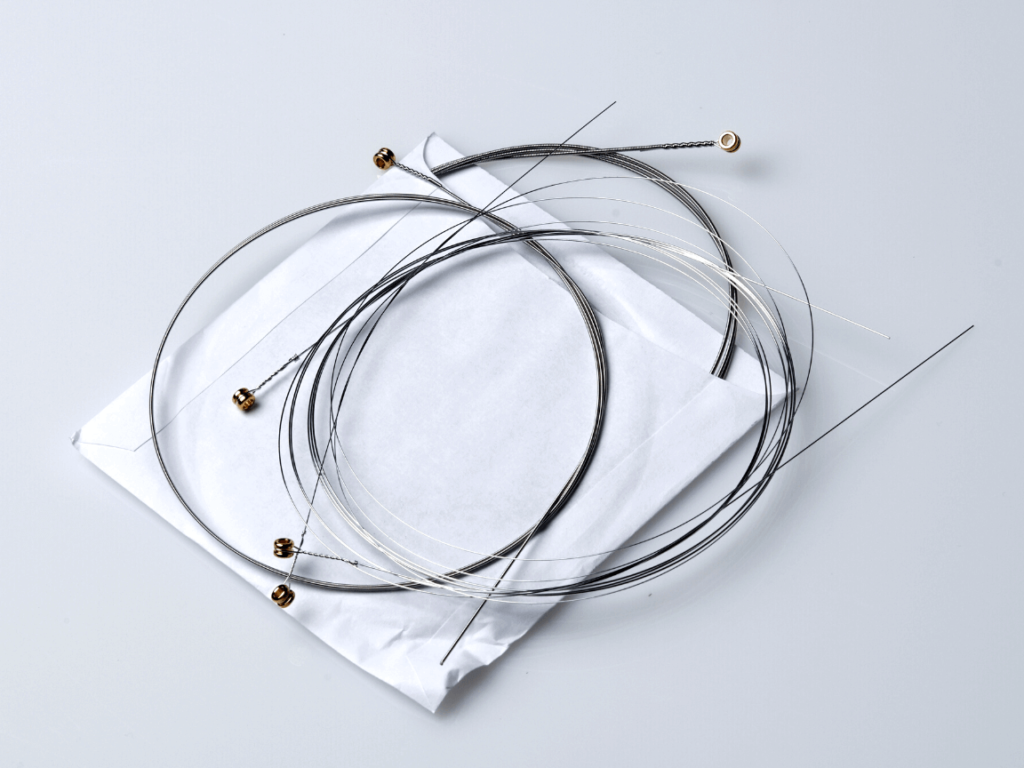If you’re an enthusiastic guitar player, you probably know the significance of having high-quality guitar strings and that it is critical to change them periodically.
But have you ever thought about the consequences that may happen to strings when you’re done with them? Are the guitar strings recyclable and do they have an expiration date?
In this article, you’ll find out some tips on how to dispose of guitar strings properly, the environmentally-friendly and economical pros of recycling guitar strings, and how to find a quality recycling center in your neighborhood. So, keep reading and learning everything about recycling guitar strings.
Are Guitar Strings Recyclable?
The answer is yes. There are many guitar strings that can be recyclable. Some types of guitar strings are produced from steel, which is considered a recyclable material. To recycle them, you may bring them to a local scrap metal recycling center. Probably, you may also find a local music store that takes used strings for recycling. Moreover, there are many companies that specialize in recycling strings. Such companies take used strings, clean them properly, and repackage them for sale, which try to keep our environment clean and healthy and make recycled strings significantly cheaper than new ones.
What Materials are Guitar Strings Made of?
Guitar strings can be made of a wide range of materials, which have their own specific properties that impact the sound and feel of the guitar. The most common materials used for producing guitar strings are steel, nickel, and bronze. However, some strings may also contain a combination of these materials.
Steel strings are the most common devices that provide a bright, crisp sound. Using nickel strings, the instrument will get a mellower sound, while bronze strings allow you to achieve a warmer and more resonant tone. Strings may also be nylon, for those who search for a softer and more mellow sound and are most commonly used in classical guitars, and fluorocarbon and titanium offer a specific combination of brightness and warmth.
The Benefits of Recycling Guitar Strings
Each musician should consider using recyclable guitar strings because they help to reduce waste and protect the environment. Reusing strings helps us to save money, as it reduces the need to purchase new strings every time they are worn out. Moreover, reusing can help to reduce environmental pollution, as the production of new strings requires energy and resources.
There are many pros for musicians, for instance, reusing strings can help to improve the sound of the guitar, as they are already broken in, so they will provide a more consistent tone.
In addition, such strings reduce the time spent on changing strings, as they are already stretched and ready to go. However, reusing makes it possible to extend the life of the instrument because the strings are less likely to break and harm them.
How to recycle guitar strings?
Recycling guitar strings is a critical aspect of being an eco-friendly musician. Recycling will help to reduce waste and can save musicians money in the long run if they actually reuse some of their guitar strings.
There are some tips on how to recycle guitar strings properly:
Tip 1: Consider donating your old strings to a local music school or charity
There are many music schools and charities that are glad to accept donations of used strings and other musical devices. It is a great way to give back to the community and help someone who really needs it. There may not be a national organization that accepts guitar string donations, but there are a lot of regional groups that do. That is why, it will be better for you to find a local charity that accepts strings.
Tip 2: Look for a local recycling program
Many cities and towns offer programs that allow musicians to bring guitar strings for recycling. Guitar strings that are made of metal, can be recycled and reused. That is why if you don’t want to donate them, search for a local recycling program or organization to which you can bring your old strings.
Tip 3: Check the local music store
There are some guitar shops that offer a recycling program for used strings or they may accept them for future use. It’s a great and convenient way to keep the environment safe when your strings can be reused. Moreover, in this case, such a store can also accept strings that have been recently used and can be reused.
Tip 4: Reuse your strings
Whether your strings are still in good working condition, you can save them for future usage. Simply make an effort to keep them clean from time to time, and spend some time winding the strings up correctly to prevent tangling or damage. That is why, in the event that you need to use new strings, you can use the ones you’ve already had instead of buying new ones. Such a thing can come in extremely handy if one in specific breaks or becomes worn out faster than the others.
Tip 5: Send them off for recycling
If none of the above options are available, you can send your used strings to be recycled. You can go the standard route and have them recycled by a certified recycling center, or you can send them off to be upcycled into something else. If you have a reuse mindset, you might search for firms that collect old strings and transform them into goods such as necklaces, bracelets, or even musical equipment.
The Impact of Not Recycling Guitar Strings
Not recycling guitar strings can lead to huge damage to the environment. Once guitar strings are not recycled, they usually wind up in landfills, where they can require up to 1000 years to finally degrade. It means that the metal used to produce the strings remains in the environment for a long time, which can be very hazardous for it.
Nevertheless, not recycling guitar strings will result in more metal being mined, which could have a detrimental effect on the environment owing to habitat destruction, pollution, and other environmental problems. If the guitar strings aren’t recycled, more resources will be needed to make new ones, which can be wasteful and contribute to climate change.
The Future of Recycling Guitar Strings
The future of recycling guitar strings is closer and bigger due to the people around the world, who understand the importance of caring about the environment and finding out the benefits of recycling and reusing materials. As the amount of guitar players increases around the globe, it is critical to find ways to reduce the environmental impact of our musical instruments.

The recycling of guitar strings is one of the best ways to save our environment, as it helps to lessen the amount of waste and to reduce the use of resources. The process of recycling guitar strings allows collecting used strings, cleaning them, and then re-using them again. It can be done either yearly or with the help of a machine.
After that, the guitar strings can be sold to specific guitar or musical stores or online retailers, who will resell or donate them to other musicians.
What do you do with old guitar strings?
When it comes to old guitar strings, there are a few different ways that you can do them. The first way is just simply to replace them with new strings.
I consider this to be the easiest option, and it’s usually the best way to ensure that your guitar sounds best. However, if they’re reusable, save them for later usage. Another method is to save the old strings and utilize them for other projects separate from any guitar related. For instance, you may use them to create jewelry or artwork, or even utilize them to manufacture unique accessories.
Finally, you could also donate them to a local music school or charity, so that they can be used to help others to play the guitar. Whatever you choose to do with your old strings, keep in mind that they can still be put to use in some capacity even after being removed from the instrument.
Are guitar strings compostable?
Unfortunately, the guitar strings are not compostable, however, it really depends on the material that was used to produce the item. Steel or nylon, which are both non-biodegradable materials, are the two most common materials used to make strings. A non-biodegradable material is a metal. It does not break down, while the less strengthened ones erode and disperse with time.
Steel guitar strings are manufactured of a core material coated in a metal alloy, while nylon strings are produced of a nylon core also coated in a metal alloy.

If there are some old guitar strings left, the best way to get rid of them is to take them to a recycling center or reuse the strings by y your own. There are some recycling centers that accept metal and plastic materials, so you should be able to drop off your old guitar strings for recycling.
How long does it take a guitar string to biodegrade?
It really depends on the type of guitar string you’re going to use. For instance, if you use steel guitar strings, it’s going to biodegrade a bit longer than nylon strings.
Steel strings can biodegrade from a few hundred years up to a few thousand years, while nylon strings will generally decompose from a few months to a few years.

Typically, the thicker the string is, the faster it will break down and various materials will take a longer or shorter period. It’s important to remember that the environment where the strings are located has an impact on how rapidly it degrades. For instance, if the string is exposed to light, air, and moisture, it will break down easily faster than it is in a dark, dry, and confined location.
Should you put guitar strings in the recycling bin?
Whether you can place guitar strings in the recycling facility depends on what type of strings you use. Steel strings are recyclable and can be melted down and reused to create new items, but you should check whether your local waste management allows them to recycle.

Different waste management programs will let you put in different materials and items that can be recycled, so make sure to do some research beforehand. For any other material, I would honestly advise doing the same to be sure that is allowed to be recycled.
Are guitar strings toxic?
Without a doubt, guitar strings are not harmful, but if they remain in contact with your skin for a long time, they may irritate it.
It may happen due to the guitar strings being made of metal, which can cause an allergic reaction in some people. If you have any skin irritations on several materials, it will be better to wear some sort of PPE when handling guitar strings.

Moreover, it is vital to clean your strings periodically to minimize any germs, which can also cause to skin discomfort. To clean your strings correctly, use a microfibre cloth and a relatively mild soap solution when you have further professional cleaning tools.
Final thoughts
All in all, the guitar strings are recyclable, but it’s critical to be mindful of the process. To guarantee that guitar strings are reused properly, it’s best to verify with the local recycling facility to be assured they accept guitar strings. If so, then you can bring the strings to the center and they will take care of the rest.
Additionally, if you don’t have access to a recycling center, you can always donate your strings to a local music school, music shop, or charity.
This way, you can help someone else get the item they need for their guitars and reduce the amount of waste that goes into landfills. Ultimately, recycling guitar strings is a great way to help the environment and give back to the community.
